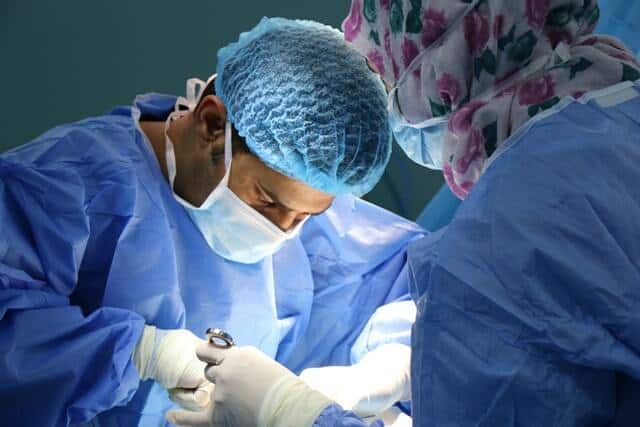If you have suffered an infection after surgery that was the result of negligent treatment, you may be entitled to compensation. A hospital owes a certain duty of care towards their patients to ensure that they are not exposed to unnecessary or avoidable infection risks. An infection that is the result of negligent treatment, could be due to many factors, but if the right precautions were not taken, you could be entitled to compensation by pursuing a medical negligence claim.
How common are infections after surgery?
In the United Kingdom, infections after surgery are unfortunately quite common, posing risks to patients’ health and recovery. According to research, surgical site infections occur in approximately 1-3% of all surgical procedures and account for 16% of all hospital acquired infections in the UK. While this might seem like a small percentage, considering the sheer volume of surgeries performed annually in the UK, it translates to a significant number of patients affected. These infections can prolong hospital stays, increase healthcare costs, and in severe cases, even lead to complications or fatalities. Therefore, it’s imperative for healthcare providers to adhere to stringent infection prevention protocols and for patients to follow post-operative care instructions diligently to reduce the incidence of infections after surgery.
Common causes of infection after surgery
After surgery, infections can occur due to various factors. One common cause is improper wound care. If surgical wounds aren’t cleaned and dressed correctly, bacteria can enter the body, leading to infection. Additionally, surgical site infections can result from contaminated surgical instruments or an unsterile operating environment. Poor hygiene practices, both pre and post-operation, can also increase the risk of infection. Furthermore, underlying health conditions, such as diabetes or a weakened immune system, can compromise the body’s ability to fight off infections. Following proper hygiene protocols, ensuring sterile surgical environments, and addressing any underlying health issues are crucial steps in minimising the risk of infection after surgery.
How do surgical infections develop from negligent care?
Whenever a foreign body is introduced surgically, there is potential for a surgical site infection (SSI) to occur. Most surgical wounds heal up normally without any complications. However, these cases can sometimes become infected, as germs and bacteria enter the area where the surgical incision was made. SSI infections can develop from 2 to 3 days after surgery until the wound is healed, though on occasion they can occur several months after the operation.
Most claims that we pursue relate to a failure to recognise and treat the early signs of infection or to take adequate steps to prevent an infection from developing in the first place.
Examples of negligent treatment that may result in post-operative infections:
- General failures in hygiene/infection control
• Failure to sterilise equipment
• Failure to isolate patients with serious infections that may spread
• Failure to identify and manage post-operative infection
SSIs are fairly common, with 1,183 cases detected in England alone in 2018/19 according to data taken from Public Health England. Those most at risk include people who smoke, people with diabetes, people who have pre-existing conditions – such as leukaemia, people having major operations – such as bowel surgery, and people having laparoscopic (keyhole) surgery.
How to tell if you have an infection
Your skin naturally protects the body from infection. However, when the right precautions have not been adhered to, you are at greater risk of infections after surgery. While many SSIs aren’t severe, you should still take caution if you develop any symptoms after surgery and contact a specialist solicitor if you believe negligent treatment has taken place.
Some common signs to look out for include:
- You feel generally unwell or have developed a temperature
● Your wound has become painful
● The skin around your wound is hot to touch and red in colour
● Drainage of green or yellow (pus) discharge
● Your wound develops an unpleasant smell.
If you believe you have an SSI that has developed as a result of negligent care, you should contact your doctor right away. Take extra care that loved ones don’t touch the wound, as this may result in it becoming more compromised.
Types of post-operative infections
Infections which occur in hospitals are usually from bacteria. There are a few different types of SSIs, which are classified on how serious the infection is, with the most severe cases causing complications such as sepsis.
Some of the most common types of infection are:
- Staph infection (MRSA) – if you have developed a staph infection after surgery, this is likely a result of the doctor or nurse failing to maintain appropriate levels of cleanliness. For instance, if the incision isn’t cleaned, the wound dressing isn’t changed, or the bedding hasn’t been tended to. This also applies to the condition of the room, which needs to be regularly disinfected.
- Sepsis – some patients show more severe symptoms even during the recovery stage, including a high temperature and an increased heart rate. This suggests the infection has spread into the bloodstream and throughout the body, which – left untreated – can lead to sepsis. This can cause organs to shut down and can be fatal.
In some cases, infection can be extremely severe and whilst it is a common complication from many hospital procedures, if it is allowed to progress without treatment the consequences can be significant. For example, in newborn babies exposed to Group B Streptococcal bacteria during birth, they can go on to develop signs and symptoms of streptococcal meningitis which can be fatal or lead to brain damage. We have represented several families who have suffered terribly as a result of negligent treatment during or after childbirth. Usually from the consequences of a failure by the hospital team to recognise early signs of infection in their child or take steps to reduce or prevent the risk of infection developing in the late stages of the pregnancy.
Can you receive compensation for an infection after injury?
If you’ve developed an infection after surgery due to medical negligence or errors in care, you may be entitled to compensation. In the UK, patients have the right to seek legal recourse if they’ve suffered harm or injury as a result of medical malpractice. Compensation can help cover medical expenses, loss of earnings, and other related costs incurred due to the infection. It’s essential to consult with one of our expert solicitors specialising in surgical negligence claims to assess your situation and determine the best course of action for seeking compensation.
If you or a loved one has developed an infection following surgery, and negligent care has been identified, you could be entitled to compensation for an infection after surgery. At Patient Claim Line, we deal with around 1 in 10 hospital negligence claims in the UK, meaning we have plenty of experience. Our specialist team of lawyers understand how complicated this process can be, so we can provide expert help throughout the process.
If you’re looking for compensation as a result of medical negligence, discover how Patient Claim Line can help in our how it works section.

